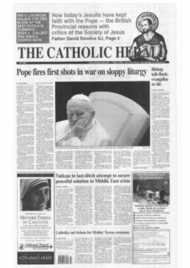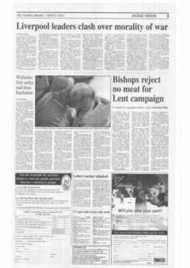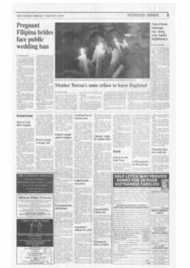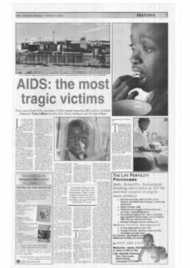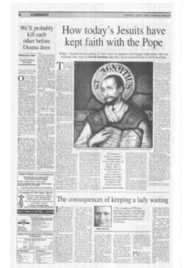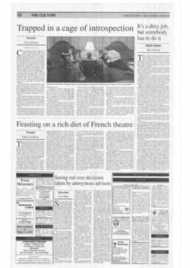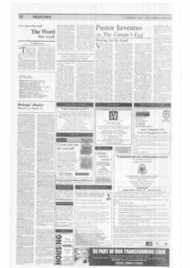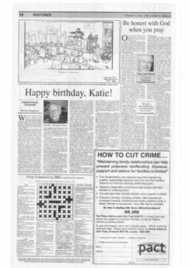Page 1, 7th March 2003
Page 1

Report an error
Noticed an error on this page?If you've noticed an error in this article please click here to report it.
Tags
Share
Related articles
Popebenedictxvi From Feared Doctrinal Enforcer To A Pope...
Priest Calls For Bishops To Resist Vatican Rules
Do Not Be Ashamed Of The Gospel, Says Pope In Mission Day...
2002 A Testing Year
Cardinal Ratzinger To Be Conclave `kingmaker' After...
BY LUKE COPPEN
POPE JOHN Paul 11 has challenged Catholics to make an "examination of conscience" over the state of the liturgy in parish churches.
In some of his most forthright comments on the subject for years, the Pope said that "sloppy" playing and "clumsy" music were distracting worshippers from the beauty of the Mass.
Speaking at his weekly general audience, he said church music needed to be -purified" so that the faithful could rediscover the grandeur of the liturgy.
'The Christian commmity must make an examination of conscience in order that the beauty of music and song increasingly return within liturgy," the Pontiff said, in an extended reflection on Psalm 150.
"Worship must be purified of stylistic rough edges, of sloppy forms of expression, and of clumsy music and texts, which are hardly consonant with the greatness of the act being celebrated, "It is necessary to discover and constantly live the beauty of prayer and the liturgy. It is necessary to pray to God not only with theologically exact formulas but also in a beautiful and dignified way." He said music and song could assist believers in prayer, which he described as the Opening of a "channel of communication" between God and his creatures.
"During prayer, we make a sort of ascent toward the divine light, and together we experience a descent of God who adapts to our limits to listen to us and talk to us," he said. The highest music is that which rises from our hearts. Its precisely this harmony that God waits to hear in our liturgies." The Pope's comments were welcomed by a leading British Church musician. Martin Baker, master of music at Westminster Cathedral, welcomed the Pope's emphasis on beauty and dignity in the liturgy.
He said: "I think it makes a lot of sense. He's affirming what Vatican 11 has always said about music."
Mr Baker said that parish churches could respond to the Pope's appeal by increasing the amount of silence at Masses.
-There's often a lack of silence in the liturgy and one hurries through the Mass to get to the end. I think that allowing for silence is as important as the music," he said.
The Pope will open up a new front in the debate about liturgy on Holy Thursday, when he publishes a long awaited encyclical on the Eucharist.
The encyclical, John Paul's first since his 1998 meditation on philosophy, Fides et Ratio, is expected to underline the fundamental importance of the Eucharist for Christian life. It is also likely to call on Catholics to show greater reverence for the sacrament.
Vatican sources told the US Catholic News Service that the encyclical will be followed this autumn by a "doctrinal note" on the Eucharist that is being drafted by the Congregation for the Doctrine of the Faith and is aimed at correcting Eucharistic abuses.
The 67-page document is in final editing stages and as of late February did not yet have a definitive title, the sources said. Holy Thursday this year falls on April 17.
In recent months, the Pope has highlighted the theme of the Eucharist repeatedly. Speaking to Brazilian bishops in January, he called the Eucharist the "supreme spiritual good of the Church" and said its "spiritual strength" must infuse the Church's evangelisation, catechesis and charitable works.
"But to give its full efficacy to the Eucharistic sacrifice, it must always be marked by the worthy and genuine celebration of the mystery according to the doctrine and directives of the Church," he told them.
In the same month, he encouraged Christian spouses to face the "inevitable clifliculties of any family life" by drawing strength especially from the Eucharist.
In a speech to the Vatican's laity council last autumn, he said that to effectively live the faith modem Catholics need to rediscover the centrality of the Eucharist and the importance of parish life.
In October 1998, the bishops of England and Wales, Ireland and Scotland published a joint teaching document on the Eucharist, entitled One Bread One Body.
The document, which sold more than 30,000 copies, reaffirmed the place of the Mass at the centre of Catholic life. It also set out a series of "general norms" on sacramental sharing with other Christian denominations.
Commenting on the document's launch, the late Carclinal Basil Hume said he was concerned by the lack of reverance shown by British Catholics towards the Eucharist He said: "One of the dangers that we experience is that there isn't sufficient reverence for the Eucharist. One aspect [of this document] is to try and prompt that reverence. As the millennium approaches, the presence of Christ in the Eucharist needs to be underlined."
Editorial comment: Page 9
blog comments powered by Disqus


